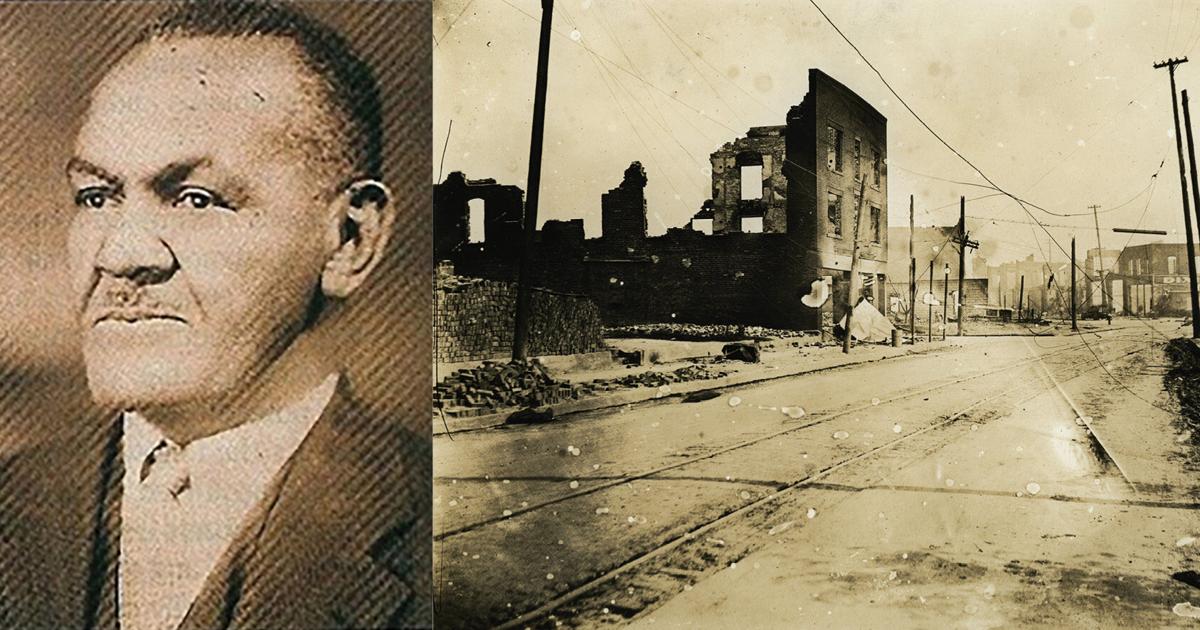
Ginnie Graham
Tulsa World Columnist
Get email notifications on {{subject}} daily!
Your notification has been saved.
There was a problem saving your notification.
{{description}}
Email notifications are only sent once a day, and only if there are new matching items.
Followed notifications
Please log in to use this feature
Log In
Don’t have an account? Sign Up Today
After J.B. Stradford lost everything in the 1921 Tulsa Race Massacre, he fled to one of his sons in Chicago to start over. He never fully recovered.
But he wrote a memoir. He didn’t want people to forget him or the power that was once Black Wall Street.
Through the years, bits of that memoir have been made public. Now, it is being published in its entirety by Texas-based Pairee Publications, curated by his great-granddaughters Leslee Stradford and Laurel Stradford, with a foreword from civil rights leader Jesse Jackson.
Although J.B. Stradford lived elsewhere for years before and after the massacre, his family choose Tulsa to hold the official book release — 11 a.m. Oct. 4 at the Greenwood Cultural Center, 322 N. Greenwood Ave.
“It’s an opportunity to bring him home,” Leslee Stradford said.
Jean Baptiste Stradford, sometimes referred to as John the Baptist Stradford, was born in Kentucky and was the first Black student to enter and graduate from Oberlin College in Ohio. He then earned a law degree from Indiana University, practicing law in Indianapolis before moving to Tulsa in 1899 with his wife, Augusta, to become a businessman. They had four children.
J.B. Stradford became wealthy with at least 15 rental properties, a 16-room brick apartment building and the luxury Stradford Hotel, which opened on June 1, 1918, and was believed to be the largest Black-owned hotel in the nation at the time. His real estate income was at least $11,000 a month in today’s dollars.
He was prominent in the community, having a hand in building a library in the neighborhood and helping finance A.J. Smitherman’s Tulsa Star Newspaper. He was also known as a civil rights pioneer.
In 1912, while on a train from Tulsa to Kansas, he was forced at the Oklahoma border to leave the higher-priced luxury car. He sued the Midland Valley Railroad but lost. He was known to criticize the Tulsa City Commission for its segregation policies and protested lynchings.
After the massacre, a white grand jury indicted J.B. Stradford and other Black men for inciting a riot. He went to Chicago, where his son successfully fought off extradition. Stradford tried to start another hotel, then attempted to reinvent himself in Kentucky and Indiana before returning to Chicago to write his memoir.
“I think at that point he was pretty much a broken man. He had to run for his life and lost everything that he had gained,” Leslee Stradford said. “He had amassed quite a fortune, and to have lost it in the blink of an eye was devastating. It was hard on him after that, especially considering he was in his mid-60s by that point.”
Listen now and subscribe: Apple Podcasts | Spotify | Stitcher | RSS Feed | SoundStack | All Of Our Podcasts
The family went on a decades-long quest to have the charges dropped. In 1996, Gov. Frank Keating issued an honorary executive pardon, and Tulsa County District Attorney Bill LaFortune asked Judge Jesse Harris to drop the old charges. So, after 75 years after the massacre, J.B. Stradford was cleared.
The memoir spans his life, from about 1866 to 1935. Unlike some survivors who didn’t talk about the tragedy, the Stradfords made sure the story was told. Leslee Stradford said she was a child when she was told “in graphic detail what had happened (during the 1921 Race Massacre), so much so that it has become embedded in my spirit.”
Leslee Stradford is a visual artist, earning bachelor’s and master’s degrees in fine arts and art education from the School of the Art Institute of Chicago. She obtained a doctorate in art education and educational administration from Illinois State University. Many pieces of her work are inspired by and focus on the massacre.
She said her great-grandfather’s stories show how he made money even at a young age to help feed his family.
“What I took away from it was how he always had an entrepreneurial spirit,” she said.
J.B. Stradford was also a man of his time in the rough-and-tumble early Tulsa days. He often carried a gun and spoke his mind freely.
“He was going to protect himself and his family, and no one was going to stand in the way,” Leslee Stradford said. “That kind of grit and strength personifies his personality. He was a strong man who knew what he wanted and wasn’t going to let anybody — Black or white — get in his way of the things we wanted to accomplish.”
J.B. Stradford’s achievements in business led to a family legacy of generations of well-educated, successful professionals. That includes Leslee Stradford’s aunt Jewel C. Stradford Lafontant-Mankarious, the first Black woman to graduate from the University of Chicago Law School and to serve as assistant U.S. attorney for the Northern District of Illinois and first woman appointed deputy U.S. solicitor general.
“We have six generations of higher-educated individuals,” Leslee Stradford said. “It was never a thought that we weren’t going to college. That was a given. I remember my aunt telling me to get the best education you possibly can because it’s the only thing that nobody can take away from you.”
The timing of the memoir’s release has to do with J.B. Stradford’s descendants making the final edits and locating a publisher, Leslee Stradford said.
“I’ve had these memoirs for more than 40 years … and decided it was now or never,” she said. “It was time to have it exposed, not just to a few members of my family, but to the world at large.”
news@tulsaworld.com
Subscribe to Daily Headlines
* I understand and agree that registration on or use of this site constitutes agreement to its user agreement and privacy policy.
Catch the latest in Opinion
Get opinion pieces, letters and editorials sent directly to your inbox weekly!
* I understand and agree that registration on or use of this site constitutes agreement to its user agreement and privacy policy.
Ginnie Graham
Tulsa World Columnist
Get email notifications on {{subject}} daily!
Your notification has been saved.
There was a problem saving your notification.
{{description}}
Email notifications are only sent once a day, and only if there are new matching items.
Followed notifications
Please log in to use this feature
Log In
Don’t have an account? Sign Up Today



